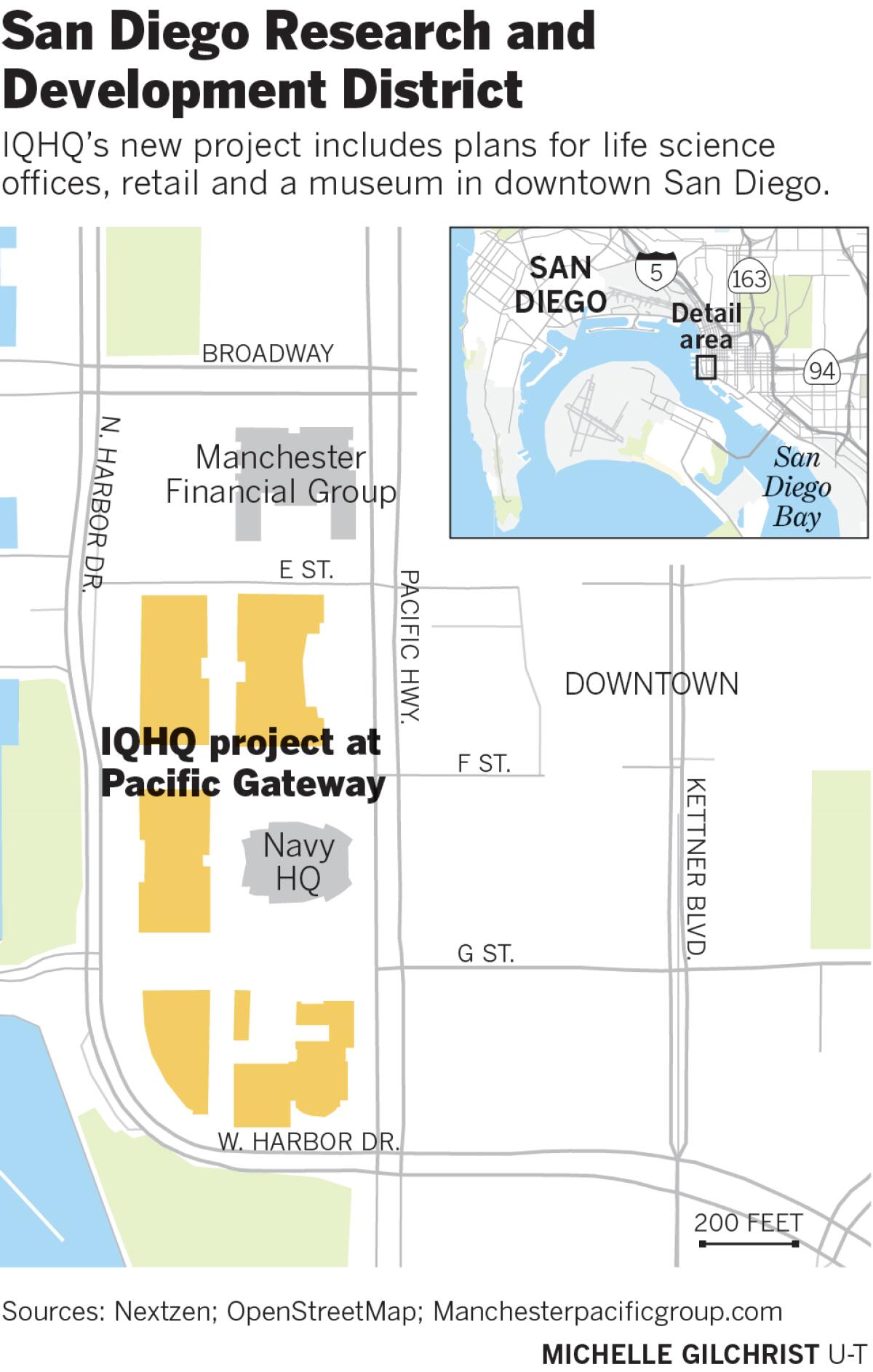Biotech buyer acquires most of Manchester Pacific Gateway for $1.5B waterfront life science campus
Real estate firm IQHQ is taking over five city blocks along the bay for what it’s calling the San Diego Research and Development District
Hoping to make a splash in downtown’s real estate market, a celebrated biotech office developer has purchased more than 8 acres of waterfront land to create a life science city along San Diego’s Bay.
Friday, the newly formed IQHQ real estate investment group, started by storied life science builder Alan Gold, completed its acquisition of around two-thirds — or five city blocks — of the development site known as Manchester Pacific Gateway. The transaction paves the way for what IQHQ is calling the San Diego Research and Development District, or RaDD, as a massive lab-filled campus where ground-floor retail and unrivaled bay views work to recruit the biggest names in the pharmaceutical industry.
“What we’re seeing in San Diego as life science thrives and matures here, and the capital is flooding it, is that the central markets are constricted,” said Tracy Murphy, president of IQHQ, in an interview with the Union-Tribune. “So through our relationship with Doug Manchester, in an off-market transaction, we were able to come to terms right after COVID hit to acquire this site. Our vision for it was not that of a conference center or hotel, but really a dynamic, waterfront urban life science city.”
Terms of the deal were not disclosed. The purchase is subject to various local and federal agreements. IQHQ plans to begin construction on site infrastructure immediately with a stated goal of completing the first phase of the district by the summer of 2023. The overall project includes a series of mid-rise structures and one 17-story tower, as well as a museum, and 3 acres of green space and rooftop decks. Development costs are expected to exceed $1.5 billion, the company said.
Manchester Financial Group, meanwhile, will retain two of the site’s eight blocks for a hotel and 1.9-acre plaza, although the firm did not share a timeline for construction.

“This incredible development will be the catalyst for biotech to relocate to downtown San Diego and will be the driving force for life sciences growth and expansion,” Doug Manchester, chairman of Manchester Financial Group, said in a statement. “With the entrepreneurism and leadership of IQHQ, and Alan Gold, San Diego will be one of the largest biotech clusters in the world.”
The change in ownership promises for the first time in years a flurry of activity on a large chunk of the 12 acres south of Broadway between Pacific Highway and Harbor Drive. The property in question has had a tortured history with redevelopment in the works since 1992, when the city and the Navy signed a development agreement. In 2006, Manchester Financial won a 99-year lease to build out its 3 million square-foot Pacific Gateway project in exchange for replacing the Navy headquarters. However, the mammoth hotel, office and retail project faced numerous setbacks, including lawsuits and difficulty obtaining financing.
Today, all that stands is the Navy’s all-new 17-story, 373,000 square-foot headquarters. The building is now complete with the Navy set to move in next month.
“It’s been a long time coming. Ever since the city did the development agreement with the U.S. Navy, we’ve been looking forward to redevelopment of this prime land on our waterfront,” said Brad Richter, who heads the city’s Urban Division and is managing on-going reviews of the new project. “Manchester Financial Group ... has struggled through litigation, recessions and all kind of complexities. So bringing on IQHQ seems like a perfect solution to bring forward the office portion of the development.”
Formed less than a year ago, IQHQ is the brainchild of Gold and partners, who have decades of experience in the industry. Gold, for instance, was the founding CEO of BioMed Realty Trust, which was sold to Blackstone Group in 2016 in a transaction valued at $8 billion.
Gold’s new firm is now focused on establishing an unparalleled live-work-play office culture in four markets: San Diego, San Francisco, Boston and the United Kingdom. Already, the real estate investment trust has raised $770 million and purchased a number of properties. Its strategy has been buoyed by a pandemic-driven real estate environment rewarding owners of lab space.
“This project is right in the fairway for what we call a transformative project that can really meet the needs of where we think life science users, and how they live, are going,” Murphy said. “It is a bit of a pioneering move ... but the labor market is really down there. If you look at any of the big (pharmaceutical companies) that are now growing in San Diego, if they really want to grow their footprints and grow their staff, they really need to consider downtown.”
The biotech dream has so far eluded downtown landlords, in part because new construction has concentrated on residential towers. Just 1.3 million square feet of office space has been built downtown over the past 20 years, Richter said.
Yet the city has, for the past two decades, wanted to attract businesses beyond government, legal and financial institutions to the market — with limited success. Now, a surge in downtown office development could help bring that vision to fruition, he said, referencing a list of active projects that includes the Horton Plaza office conversion project.
Currently, there is just shy of 1.15 million square feet of private office development under construction downtown, according to city development records. The sum doesn’t include the 1.35 million square feet of office space planned by the San Diego Padres for Tailgate Park. And IQHQ’s Research and Development District would introduce another 1.3 million square feet spread across five buildings, Richter said.
“The tenancy (developers are) targeting — life sciences — would be great for downtown,” he said, adding that the amount of in-development office space could also lead to oversaturation.
Real estate experts who caught wind of IQHQ’s interest earlier this year surmise that the firm can make happen what others have only talked about.
“New clusters have been very reluctant to come downtown, principally because ... they don’t want to be the first one to put their foot in the water,” said real estate analyst Gary London. “So with Alan Gold coming in, saying essentially that downtown could be a new biotech hub, the potential for him seeding a whole new industry is way higher than it has ever been. ... Whatever is achieved cluster-wise at (the new project) bleeds over into projects like Horton Plaza ... and ultimately Tailgate Park.”
The sentiment is not lost on IQHQ.
“We’re a little bit of a trendsetter,” said Murphy, the IQHQ president. “There’s a lot of what I call, ‘copycat capital.’”
Beyond building best-in-class research buildings, IQHQ says it will pay special attention to the ground-level promenade, where the firm expects to put multi-level restaurants, marketplaces and trendy grocers, totaling as much as 200,000 square feet of retail.
The point is to keep workers on site long after the workday is done, Murphy said. With that in mind, IQHQ is working with design firm Gensler to create attractive buildings with natural light and enjoyable green spaces for the broader public.
Per the existing development agreement, the project will need the city’s input at various stages. Currently, city staffers are reviewing the proposed district’s conceptual drawings.
Get U-T Business in your inbox on Mondays
Get ready for your week with the week’s top business stories from San Diego and California, in your inbox Monday mornings.
You may occasionally receive promotional content from the San Diego Union-Tribune.
